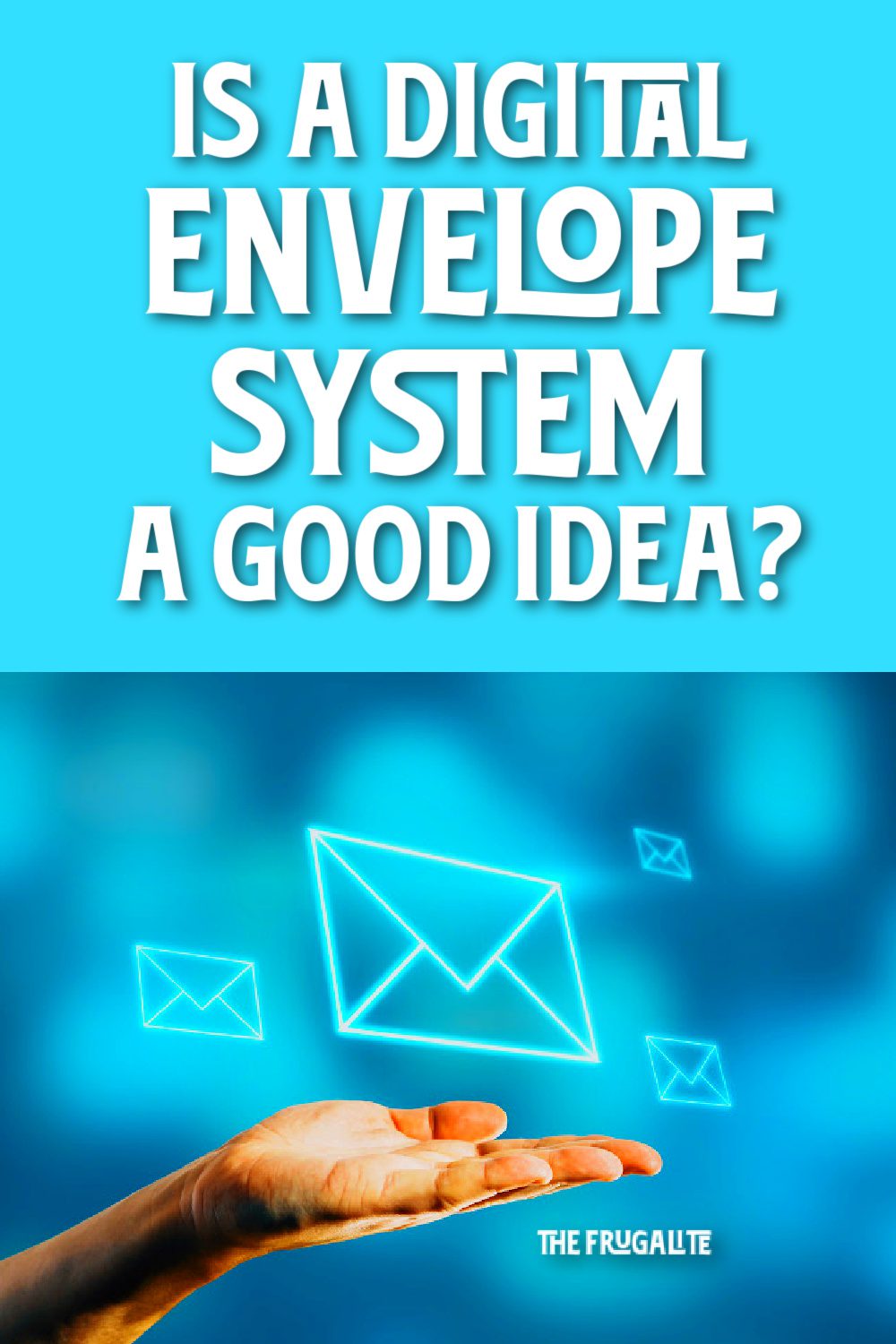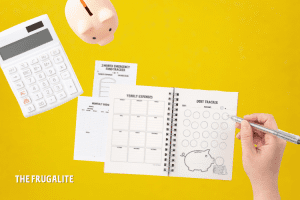(Psst: The FTC wants me to remind you that this website contains affiliate links. That means if you make a purchase from a link you click on, I might receive a small commission. This does not increase the price you’ll pay for that item nor does it decrease the awesomeness of the item. ~ Daisy)
By the author of What School Should Have Taught You.
If you’ve been considering delving into the envelope system of late, you’re likely reading everything that you can on the subject. And, this being the case, you’ve probably wondered about the separations that your local bank can do with your checking account.
At my bank, for instance, each checking account can also set up a Christmas separation and a vacation separation. That way you can put money into these two separate categories that are separate from your main checking account.
It’s a digital envelope system, if you will.
Some banks offer even more digital envelopes, allowing you to open up as many different categories as you would like.
You could have your main checking account, and then four other digital envelopes for shoes, Valentine’s Day gifts, Harley Davidson parts, and dinners at Chili’s.
But then here is the question: are digital envelope systems a good idea?
Do they actually help you to save money? Or do they really defeat the point of the envelope system entirely?
Here are my thoughts…
One of the main reasons that the envelope system works is because it places cash in peoples’ hands. When you can physically see how much money you have left in your hands, you develop something of a relationship with it.
You like where it’s at and you don’t want it to leave.
It forces you to think twice about the purchases that you make. It’s comforting to see an envelope full of green, and when you see something at the store that you’re considering purchasing, the mental task of asking yourself, “Okay, do I really want to trade my green for that new Best of Yodeling 2022 CD (Daisy’s favorite)?”
You’re much more likely to say no to just about any purchase when it comes to departing with your buddies George, Abe, and Andy.
It’s the physical act of seeing that makes the envelope system work.
With a digital envelope system, there is no seeing.
But then the old mantra surfaces, “Out of sight, out of mind.” And this is the area where I think a digital envelope system may have some benefits.
Personally, I don’t like using a digital envelope system for monthly purchases. I just don’t think it works for that. When it comes to restaurants, fun money, and the like, it’s far too easy to let emotion rule over your wallet rather than common sense when you can’t see the cash go bye-bye (buy-buy?).
I have had some success with using a digital envelope for Christmas purchases, however. That way the money is in there, I don’t see it, there’s no temptation to spend it because “out of sight, out of mind,” and it’s there for when I need it in December.
Some banks out there will even let you do an automatic deposit into that digital envelope every time your paycheck is deposited. That’s a feature that I actually do like. If the money disappears as soon as it hits my checking account, it’s almost like I don’t miss it in that sense. I see what actually hit the checking account, and I guess it just kind of forces me to figure out how to live off of what I see sitting there.
I still made the same amount of money with the Christmas digital envelope and all that, but because I only see a small portion of it taken away and deposited out of sight, it helps you to mentally cope with everything.
Maybe that all sounds a bit bizarre, but I really think that’s the way it is.
That’s something that I really think that people need to know about money: there’s a lot of psychology at play.
Why is it that marketers spend so much time researching human psychology? Why is it that companies spend thousands of dollars measuring people’s pupil dilations, heart rate, and respirations per minute when they see certain advertisement displays?
It’s because marketers are trying to figure out the best way possible to manipulate human emotion (aka, human psychology). Their job is to get you to spend money, and they study psychology to get you to do that.
The envelope system – in all its forms – is your way of using human psychological tricks against yourself to help yourself.
So while I think that with certain categories digital envelope systems may be beneficial, I still don’t like the idea of using it across the board with my entire budget. For me, I do much better with an actual paper envelope with actual paper money compared to a string of code that’s assigned to my name.
But hey, those are just my thoughts on the subject. What are yours? Do you think I’m on the money here (haha), or do you have other opinions? Let us know in the comments below.
About Aden
Aden Tate is a regular contributor to TheOrganicPrepper.com and TheFrugalite.com. Aden runs a micro-farm where he raises dairy goats, a pig, honeybees, meat chickens, laying chickens, tomatoes, mushrooms, and greens. Aden has four published books, What School Should Have Taught You, The Faithful Prepper, An Arm and a Leg, The Prepper’s Guide to Post-Disaster Communications, and Zombie Choices. You can find his podcast The Last American on Preppers’ Broadcasting Network.












4 thoughts on “Is A Digital Envelope System A Good Idea?”
It used to be called Christmas Club. Nothing wrong with a digital envelope as long as one is disciplined OR it is not convenient to tap into the “envelope”. And for some, out of sight is out of mind. I send money to a multiple accounts each paycheck. What goes to checking is used to pay bills, buy food, gas etc.
Whether tangible envelope (cash) or digital, once the monies are spent, it is gone.
THE financial advise guru is Dave Ramsey. On radio, in his books, and seminars, he strongly encourages paper envelopes. Food, rent, utilities, taxes, and so on. Listen to him if you can, or see if your local library has his books. You can buy his books from his website, but he only accepts DEBIT cards. (“You can;t spend money you don’t have”.)
Most of the financial forecasts I see are oriented to the nearly unstoppable shift to abolish cash to be replaced by all digital money (in this country called “Biden bucks”). Some 90% of central banks worldwide are climbing onto that same band wagon.
That would force anyone’s paper envelope system to either be replaced by the zero-privacy and power-grid dependant digital money system — OR simply go into the trash while containing useless pieces of paper once called US dollar bills.
I have two strong objections to Dave Ramsay’s advice. His acceptance of debit cards only carries a high legal risk for you. If an identity thief manages to steal the data from your debit card, your chances of ever getting the funds back that the thief stole to make purchases you knew nothing about … are slim to none. In contrast, it a credit card was used instead and some bad guy used a skimmer or an RFID equivalent to steal your data to make purchases, the laws are much more protective for you to get your money back. As long as you pay off any credit card balance down to zero every month on time, you will not have to pay that card provider a dime in user fees. That’s why I strongly dislike using debit cards for online purchases.
His other bad advice is about paying down multiple debts by starting with the highest balance debts first. If instead you start with the debt that has the highest interest rate and work your way down through the list that way … it will end up costing you less in the long run even if you don’t get the “emotional kick” that Ramsay thinks you need to stick with the project while using his method.
–Lewis
Double check with Dave Ramsey again regarding paying the high balance debts first. Actually, he indicates the opposite. By paying the smaller credit card balances first, you accomplish a result. We use Dave Ramsey and it has been a blessing for 15+ years. Of course, we could use a refresher course and probably do a much better job than we are.